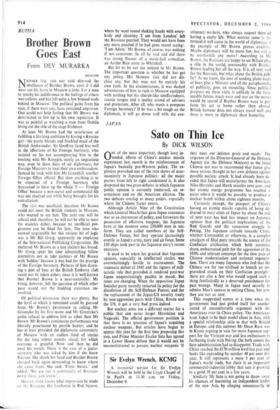Brother Brown Goes East
From DEV MURARKA
MOSCOW
NEITHER fog, rain nor cold dimmed the ebullience of Brother Brown, even if it did wear out his hosts in Moscow a little. For a man so touchy his indifference to the feelings of others was callous, and has left quite a few bruised souls behind in Moscow. The political gains from his visit, if there were any, have remained unproven. One could not help feeling that Mr Brown was determined to live up to his own reputation. It was as painful as watching a man from Dublin living out the role of the stage Irishman.
At least Mr Brown had the satisfaction of fulfilling a life-long ambition by kissing a Russian girl—the pretty blonde and freckled maid of the British Ambassador. Sir Geoffrey fared less well in the affections of his Foreign Secretary, who insisted on his not accompanying him to the meeting with Mr Kosygin, surely an ungracious way, even in these days of air diplomacy, for Foreign Ministers to treat their own ambassadors. Instead he took with him Mr Greenhill, another Foreign Office official. But then anything is to be expected of a Foreign Secretary who threatened to blow up the whole 1— Foreign Office' because a non-secret and commercial file was not checked out while being brought for his consultation.
The visit was unofficial, therefore Mr Brown could not meet the British students in Moscow, who wanted to see him. The next one will be official and, therefore, he will not be able to meet the students either, because no unofficial pro- gramme can be fixed for him. The man who seemed responsible for this curious bit of logic was a Mr Bill Greig, apparently an employee of the International Publishing Corporation. He sheltered Mr Brown as a hen shelters her brood. Mr Greig spent his time admonishing fellow journalists not to take pictures of Mr Brown with 'kiddies' because it was bad for the prestige of the Foreign Secretary. Pictures of him down- ing a pint of beer at the British Embassy club could not be taken either, since it is well-known that Brother Brown is a near-teetotaller. Mr Greig, however, left the question of which other pose would suit the budding statesman un- resolved.
Of political discussion there was plenty. But the level at which it remained could be guessed from Mr Brown's persistence in calling. Mr Gromyko by his first name and Mr Gromyko's polite refusal to address him as other than Mr Brown. Mr Brown's continuous performance was liberally punctuated by puerile banter; and he has at least provided the diplomatic community of Moscow with an endless fund of stories for the long winter months ahead, -for which everyone is grateful. Now and then he did meet his match. There is the case of a junior secretary who was asked by him if she knew Russian. She shook her bead and Brother Brown charged back again demanding to know where she came from. She said, 'From Sussex,' and added, We are not a community of Russians down there, you know.'
Heaven alone knows what impression he made on the Russians. His bonhomie in Red Square, where he went round shaking hands with every- body and chanting 'I am from London' left the Russians puzzled. They would not have been any more puzzled if he had gone round saying: 'I am Adam.' Mr Brown, of course, was nothing if not consistent. In all he said and did there was strong flavour of a music-hall comedian, an Archie Rice come to Whitehall.
But let us be not too unkind to Mr Brown. The important question is whether he has got any policy. His Moscow visit did not dis- close any, but this may not be entirely his own fault. In the circumstances, it was dashed adventurous of him to rush to Moscow equipped with nothing but his cherub-like unaffectedness, caustic tongue and a motley crowd of advisers and protectors. After all, who wants a pompous Foreign Secretary? If he was a bit rough on the diplomats, it will go down well with the con- stituency workers, who always suspect them of having a cushy life. What worries some is the turmoil it will cause in the world of diplomacy if the example of Mr Brown proves catching. Maybe diplomacy will be more fun, but will it be worthwhile any more? According to Mr Brown, the Russians are happy to see Britain play a role in the world, presumably with Brother Brown leading her all the way. It is all very well for the Russians, but what about the British pub- lic? As we know, the cost of sending plane-loads of beer, plus a Minister and all the paraphernalia of publicity, goes on mounting. Since political progress on these visits is unlikely in the fore- seeable future, much wear and tear on the nerves would be spared if Brother Brown were to per- form his act at home rather than abroad. British humour does not always travel well and there is more to diplomacy than bantering.


































 Previous page
Previous page